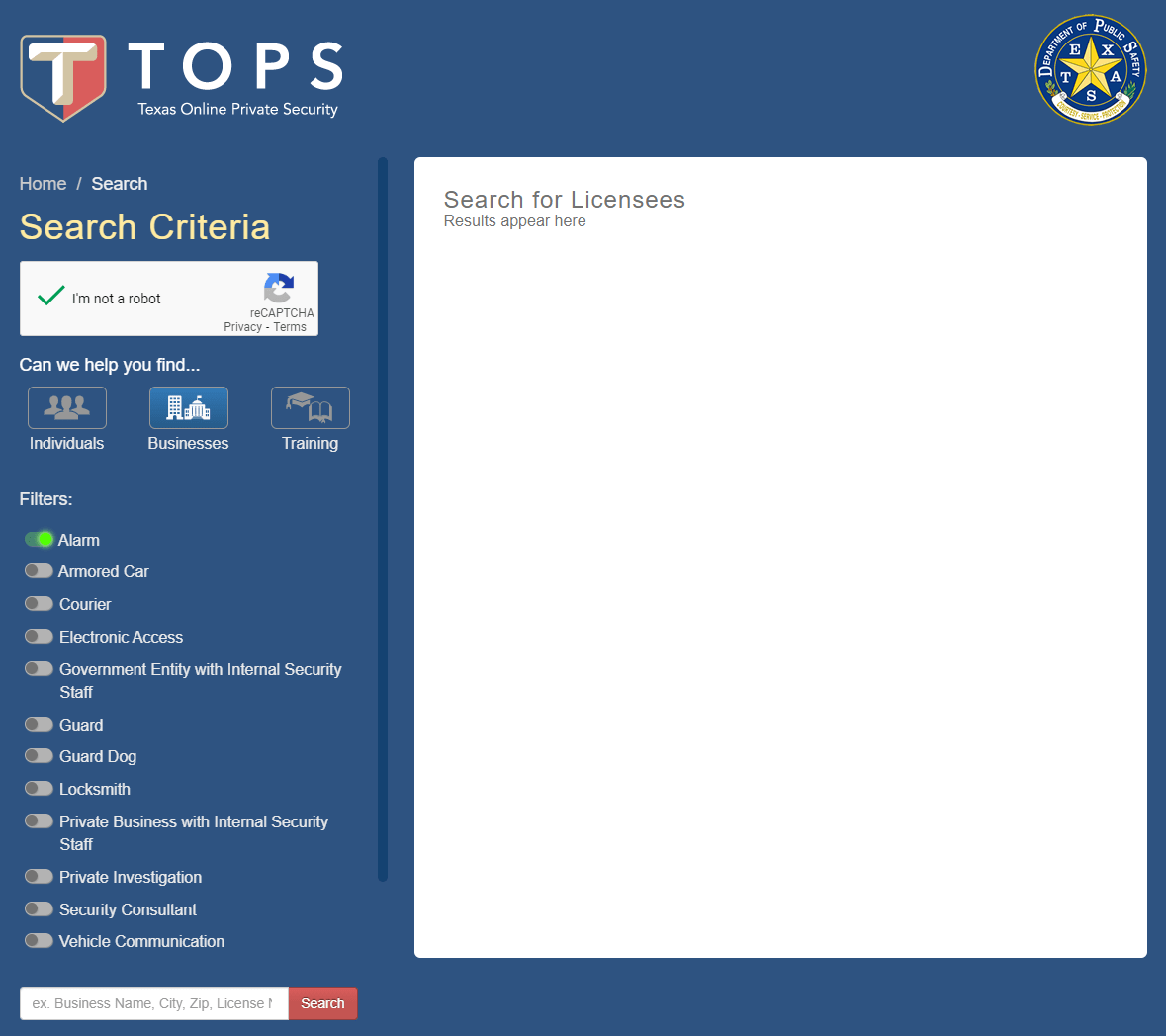Article – Licensed Professionals (Articles)

Licensed Professionals
Hiring Licensed Professionals to perform state-regulated services has many positive benefits:
- Legal Compliance: Licensed professionals are trained and certified to meet specific standards set by regulatory bodies. By hiring them, businesses and individuals ensure compliance with all relevant laws and regulations. This reduces the risk of fines, penalties, or legal actions for non-compliance.
- Quality Assurance: Licensing typically requires professionals to demonstrate competence through education, training, and sometimes examinations. This ensures that they possess the necessary skills and knowledge to perform their duties competently and safely. Hiring licensed professionals thus often translates to higher quality work and services.
- Consumer Protection: Licensing frameworks often include mechanisms for consumer protection, such as insurance requirements, complaint processes, and disciplinary actions against professionals who fail to meet standards. Consumers benefit from knowing they are dealing with qualified individuals who are accountable for their actions.
- Risk Mitigation: Professionals often carry liability insurance and adhere to codes of conduct or ethics mandated by their licensing boards. This mitigates risks for clients and employers against errors, negligence, or misconduct.
Conversely, hiring unlicensed professionals can create various consequences:
- Legal and Financial Risks: Operating without proper licenses can result in legal consequences, including fines, cease-and-desist orders, or even criminal charges in some cases. These penalties can be costly and damaging to a business’s reputation.
- Quality and Safety Issues: Unlicensed individuals may lack the necessary skills, training, or experience to perform tasks safely and effectively. This can lead to substandard work, safety hazards, or damage to property, potentially exposing clients to financial liabilities or personal injury.
- Reputation Damage: Businesses or individuals that engage unlicensed professionals risk damaging their reputation. Word-of-mouth and online reviews can be negatively impacted if customers discover that services were provided by unqualified or unlicensed individuals.
- Lack of Recourse: Without a license, there may be limited avenues for clients to seek recourse in cases of dissatisfaction, disputes, or damage caused by the services provided. Licensed professionals are typically bound by professional standards and have mechanisms in place for handling complaints or disputes.
In summary, hiring licensed professionals ensures legal compliance, enhances service quality, protects consumers, and mitigates risks. Conversely, engaging unlicensed individuals can lead to legal troubles, compromised service quality, reputation damage, and limited recourse in case of issues. Therefore, in regulated environments, it is generally advisable to prioritize hiring licensed professionals for services that require such credentials.
• • •
Consumer awareness with regard to their insurance carriers is of paramount concern.
Hiring unlicensed individuals to perform state-regulated services can have significant legal, financial, and safety ramifications.
Here are some specific points to consider:
- Legal Consequences:
- Fines and Penalties: Many states impose fines on both the individual performing the service without a license and the employer who hires them. These fines can range from hundreds to thousands of dollars depending on the severity and frequency of the offense.
- Criminal Charges: In some cases, particularly for repeat offenders or in cases of gross negligence, criminal charges may be brought against both the individual and the employer.
- Financial Liability:
- Voided Contracts: Contracts with unlicensed individuals may be deemed void or unenforceable in court. This means that if a client is dissatisfied or suffers damages due to poor workmanship or negligence, they may not have legal recourse to recover damages.
- Cost of Remediation: If work performed by an unlicensed individual fails to meet standards or code requirements, correcting or redoing the work can be costly. This burden typically falls on the property owner or the employer who hired the unlicensed worker.
- Quality and Safety Concerns:
- Substandard Work: Unlicensed individuals may lack the necessary training, skills, or knowledge to perform the job correctly. This can lead to substandard work that fails to meet safety codes or industry standards.
- Safety Risks: Certain services, such as electrical work, plumbing, or construction, pose significant safety risks if not performed correctly. Hiring unlicensed workers increases the likelihood of accidents, injuries, or property damage.
- Reputation and Trust:
- Damage to Reputation: Employing unlicensed workers can damage the reputation of businesses or individuals. Clients may perceive them as untrustworthy or irresponsible, affecting future business opportunities.
- Loss of Trust: Clients may lose trust in businesses or individuals who prioritize cost-cutting over compliance with legal and safety regulations.
- Insurance Issues:
- Coverage Voidance: Insurance policies may not cover damages or losses resulting from work performed by unlicensed individuals. This can leave both the employer and the client financially vulnerable in case of accidents or property damage.
- Verify Insurance Coverage: If an unlicensed contractor tells you he has insurance, it’s prudent to verify. Remember, Insurance companies are in business to make money … not pay claims. They generally require contractors to be licensed if their policies are to cover regulated work.
- Impact on Licensed Professionals:
- Unfair Competition: Licensed professionals who comply with state regulations may face unfair competition from unlicensed workers who can undercut prices due to lower overhead costs. This undermines the integrity of the industry and may lead to fewer opportunities for properly trained and licensed workers.
In conclusion, Hiring Unlicensed Individuals to perform state-regulated services is not only illegal in many cases but also poses serious risks to both employers and clients. It’s crucial to adhere to licensing requirements to ensure compliance with laws, uphold safety standards, maintain trust with clients, and avoid potential legal and financial liabilities.
An example of occupational licensing with regard to Private Security services in Texas:
The Private Security profession in Texas is regulated by the Texas Department of Public Safety
Did you know . . . individuals installing video surveillance cameras in Texas are required to be licensed?
Let’s review the statutes:
What does this mean?
- Sec 1702.001. SHORT TITLE (Cited as the Private Security Act)
- Sec. 1702.002. DEFINITIONS
(1) “Alarm system” means:
(A) electronic equipment and devices designed to detect or signal:
(i) an unauthorized entry or attempted entry of a person or object into a residence, business, or area monitored by the system; or
(ii) the occurrence of a robbery or other emergency;
(B) electronic equipment and devices using a computer or data processor designed to control the access of a person, vehicle, or object through a door, gate, or entrance into the controlled area of a residence or business; or
(C) a television camera or still camera system that:
(i) records or archives images of property or individuals in a public or private area of a residence or business; or
(ii) is monitored by security personnel or services.
Therefore, according the the statute definitions under (1)(C) above, any company or individual installing CCTV Surveillance Cameras (analog or network) must hold a Class B Security Contractor License with the “Alarm” Endorsement.
If they are unlicensed, and they proceed to install this equipment, they will be in violation of the Private Security Act and you may be dragged into this violation as well.
A Civil Penalty may be imposed on the installer and the person who hired the installer!
(a) A person who is not licensed under this chapter, who does not have a license application pending, and who violates this chapter may be assessed a civil penalty to be paid to the state not to exceed $10,000 for each violation.
(b) A person who contracts with or employs a person who is required to hold a license or security officer commission under this chapter knowing that the person does not hold the required license or commission or who otherwise, at the time of contract or employment, is in violation of this chapter may be assessed a civil penalty to be paid to the state in an amount not to exceed $10,000 for each violation.
(c) A civil penalty under this section may be assessed against a person on proof that the person has received at least 30 days’ notice of the requirements of this section.
The state of Texas makes it relatively easy to verify licensing by using their search facility.
(https://tops.portal.texas.gov/psp-self-service/search/index)
When filling out the search form below:
- Click the box “I’m not a robot” (a green checkmark appears);
- Select the “Businesses” box (it then highlights),
- Select the “Alarm” endorsement (the slider turns green);
- Enter the Company Name in the field beside the red “Search” button.
- Click the Search button and the results will display on the right side.
- Do the same for individuals of the licensed company (select the “Individuals” box instead).
The Administrator
